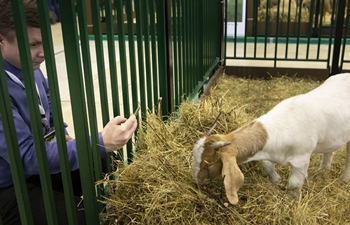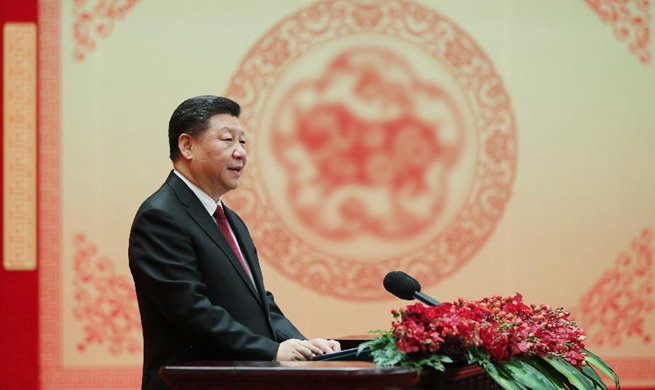LONDON, Feb. 7 (Xinhua) -- The Bank of England (BoE, or British central bank) will keep its eyes fixed firmly on Brexit, analysts said, as the BoE's rate-setting Monetary Policy Committee (MPC) announced on Thursday that it would leave the rate the same.
Economists expected there would be no rise, and the reason was not that the economy cannot support a hike, but that Brexit was staying the Bank's hand.
Thomas Pugh, UK economist at Capital Economics, a London-based economics group, told Xinhua: "I do not think the Bank's MPC will make any decision until Brexit is resolved."
"The conventional wisdom is that the MPC would have been raising rates if Brexit was sorted," Pugh added.
Brexit uncertainty is weighing heavier on the economy, with the closer Britain gets to the March 29 date for leaving the European Union (EU) without having concluded a formal agreement.
Japanese car manufacturer Nissan this week said it was switching production of its X-Trail sports utility vehicle from Britain to Japan.
Nissan Europe chairman Gianluca de Ficchy said in a statement: "While we have taken this decision for business reasons, the continued uncertainty around the UK's future relationship with the EU is not helping companies like ours to plan for the future."
Purchasing Managers' Index (PMI) surveys published in the past seven days in both the British manufacturing sector, an important player in the export market, and the dominant services sector, covering nearly 80 percent of the economy, showed that activity had slowed down, and that the slowdown was attributable in part to Brexit.
SOARING INFLATION
Yet, there are clear signs in the British economy that would normally prompt the central bank into raising the bank rate.
The BoE's primary target is to keep consumer price index (CPI) inflation as close to 2 percent as possible.
At the time of the Brexit referendum vote CPI inflation was just 0.8 percent, but the sudden sharp collapse of sterling on foreign exchange markets sent inflation upwards as imported consumer goods and raw materials for manufacturers became more expensive.
Inflation peaked at 2.8 percent in late 2017, and has been on a gradual decline throughout 2018. The latest figures, for December, show CPI inflation at 2.1 percent in December.
As CPI inflation rate has declined, wage growth has strengthened, at an annual rate of 3.4 percent growth in the three months to the end of November.
This is partly in response to the low unemployment rate, at 4 percent in the three months to the end of November.
All these factors would normally indicate that there is little slack left in the economy and that it would be in danger of overheating in the future. But Brexit hangs over everything at the moment.
"Fully in line with expectations, the Bank held interest rates at 0.75 percent with a unanimous 9-0 vote within the MPC, which matched the MPC vote at the December meeting," Dr Howard Archer, chief economic adviser to EY ITEM Club, a London-based financial group, said Thursday.
"With heightened Brexit uncertainties currently dominating the outlook, the global outlook worsening and the UK economy stuttering, the MPC is clearly much more concerned about the outlook for the UK economy and is locked in 'wait-and-see mode'."
Archer said the BoE had highlighted that Brexit uncertainties "very much cloud the outlook for the economy and interest rates" and that a no-deal Brexit could see rates fall as well as rise, "depending on the balance of how the economy's supply capacity and how demand is perceived to be affected. Exchange rate movements would also be a factor".
However, sterling reacted well to the MPC decision and the subsequent press conference by BoE governor Mark Carney Thursday afternoon, first losing ground but then recovering to a higher rate than it started the day at.
PAUSE AFTER BREXIT
British Prime Minister Theresa May is seeking a solution to the current impasse over the Brexit withdrawal agreement she has negotiated with the EU, but which has been rejected by the House of Commons.
If May is successful, or if another way is found that gives certainty over the Brexit process, then Britain may well quit the 28-nation bloc at the end of March.
But the BoE would still be likely to wait and see how the economic wind blows, as the economy settles down to some new realities and changed fundamentals.
An immediate rate rise would be unlikely, according to Archer: "Even if the UK does ultimately leave the EU at the end of March with a deal, the BoE may well delay hiking interest rates for a few months to see how the economy is performing in the aftermath of the UK's departure."
Pugh agreed: "They may wait to see how the economy evolves rather than hike rates straightaway."
But the prospect of a disorderly Brexit, one in which Britain quits the EU with no deal, could have a profound and immediate negative shock on the economy and lead the BoE to step in with a rate cut to stimulate growth.
Pugh said: "If we get a disorderly Brexit the Bank would probably cut rates."













